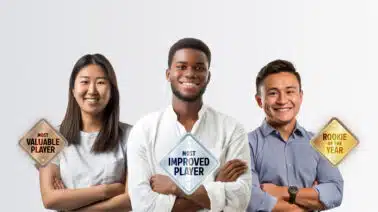
A recent CNBC article made the point clearly and succinctly—”There’s no question America has a skills gap.” Drawing on a study by the Career Advisory Board, in which 62% of the 501 hiring managers polled said that higher education students were “underprepared” to meet current skills needs, the article specifically looks at why industry giants like Google are partnering with learning providers like Udacity to address this critical challenge.
A Win-Win Learning Model?
The answer has to do with two key features of our learning model: 1) We are able to teach the most important, most relevant, most up-to-the-minute skills, and 2) Our students are able to turn their learnings around quickly, and demonstrate their proficiencies to prospective employers in tangible, meaningful ways. The rapidity and efficiency of this agile model results in uniquely prepared learners getting fast-tracked into critical open roles the moment they open.
At face value, this is a win-win for all—industry makes clear the skills they’re seeking, learning providers build laser-focused programs that teach those skills in targeted ways, students accrue desirable skills, and organizations hire those students.
Defining the Value of Learning New Skills
There is a bigger story here however that bears some investigation. Essentially, it comes down to the question of, who defines “value” when it comes to skills?
A really, really excellent article (the conclusions of which I nonetheless totally disagree with, for reasons I’ll explain later in this post) entitled “Beyond The Skills Gap” puts the question this way:
“Is the answer to providing career competencies to re-orient the purpose of higher education to focus on jobs alone, and to pursue structural reforms like internships and career pathways?”
The article, which is thorough, well-researched, and exceptionally valuable, answers this with an “unequivocal no.” This is disappointing, because the reasons why this answer should be “yes” are written within the post itself—the author just doesn’t seem to recognize this. In the article, the author chronicles his efforts to “ground-truth” a deeper understanding of what skills and career competencies really mean out in the real world, and the answers he unearths underscore a critical misunderstanding about the kind of learning model we advocate. Here are the key findings the author delivers:
- Up-to-date technical expertise—both conceptual and practical—is highly valued
- It’s not about stand-alone skill sets. Career competencies as discipline-specific “habits of mind”
- The primacy of a strong work ethic
- Lifelong learning
- Problem-solving in ill-structured situations
- Active learning across the disciplines is key to deeper learning
- Cultivating career competencies and social capital through work-based learning
- Workplace training: Employers’ responsibility to continue cultivating career competencies
How the author could enunciate so clearly these critical observations, and yet still come to the following conclusion, seems baffling:
“Innovation and change needs to happen around a core, foundational commitment to students’ well-being over the long term, and not on panicked responses to declining revenue and evidence-free promises of the value of badges, competency-based education, and a wholesale realignment of the sector to meet the needs of employers and the labor market.”
The author’s concern here seems to be that traditional institutions of higher learning—in a panic, and in an effort to remain relevant—are moving towards single-minded “vocational preparation” at the expense of students, educators, and society as a whole. What the author fails to understand, is that groundbreaking organizations like Udacity are providing learning opportunities that are every bit as robust, wide-ranging, and whole-student oriented—while also getting students job-ready with skills that are going to be relevant for years, if not decades to come.
Lifelong Learning and Skills-Based Education: Myth vs. Reality
Sadly, it’s an all-too-common phenomenon to find naysayers taking stances like the above, and I believe it’s largely due to the fact that too many educators simply don’t know what learning with a platform like Udacity is really like. They don’t seem to see the engagement, the dynamism, the community, the hands-on building, the excitement, the passion, the innovation. Instead, it often feels like in their collective minds-eye, they only see passive, asocial video junkies mastering mono-dimensional tech skills through rote repetition, in the service of landing low-level IT jobs at faceless startups. Nothing could be further from the truth!
To succeed in a program like Udacity’s Nanodegree programs, you must have incredible self-discipline. You must be a proactive community member, initiating your own outreach. You must manage your time, your resources, and your energy as you balance your learning against other commitments. You must have an unshakeable work ethic, be able to self-impose your own structures and deadlines, and be able to successfully improvise your way through a learning universe largely of your own design. You must show, not tell. You must genuinely build, and be prepared to showcase what you have achieved in ways that make clear the value you bring to the table.
In short, you are in charge of your own success. We support you every step of the way, but the extent to which you marshal available resources—forums, meet-ups, mentors, and more—is up to you. While everything you need to succeed is made available to you, the onus is on you to manage, leverage, and deploy those resources as you pursue success—there is no hand-holding. Most important of all, you must be a committed lifelong learner, ready to return to the classroom again and again as new challenges and new opportunities arise.
When an employer looks at a Udacity graduate, this is what they see. Not just a list of cutting-edge skills. Not just a portfolio of projects that demonstrate genuine mastery. What they also see is an independent, passionate, dedicated, self-motivated, lifelong learner.
Social Good
In saying all the above, we haven’t even touched on actual content. This is one of the other great misconceptions about our kind of learning. Contrary to assumptions being made about skills-based higher education offered online, Udacity students are deeply engaged with the most pressing issues of our time. Our students are on the absolute cutting-edge of technology and its implications for social good—they are learning firsthand about artificial intelligence, automation, self-driving cars, and robotics. They are investigating at close range how deep learning will impact healthcare, science, education, security, and more. Our students enter these programs not merely because they want money or job security. They enter these programs because they want to change the world for the better, and it is within the boundaries of these transformational technologies that global change is being fomented, articulated, and enacted. Here is Oren Meiri, a student in our Self-Driving Car program:
“I believe autonomous vehicles will have an enormous impact to transform cities — the need for fewer city-center car parks, reduction of traffic jams — whole industries such as taxis and deliveries, and our lives, by reducing the number of cars per household and their associated costs, and also by becoming more ecological.”
And here is the concluding paragraph of the “Beyond The Skills Gap” article:
“So let’s reframe the debate about a skills gap to one focused on building a skills infrastructure for students’ to acquire 21st century competencies. Doing so will help students throughout their working lives, employers by providing them with skilled and flexible workers, and society by preparing a citizenry ready to critically engage with the pressing social, environmental, and economic issues of the day.”
I think this is exactly what we are trying to do, and I think it’s why lifelong learners like Oren Meiri come to Udacity to learn.
The Definition of Value
To circle back to the question implied by the title of this post, the answer is that society itself ultimately owns the definition of value when it comes to skills, and industry is the arena within which value is made manifest. Put simply, businesses cannot ultimately succeed without customers, so they must continue to find ways to serve their customers effectively. Thus, the customers of industry power the innovations industry must pursue to survive. This in turn drives industry’s ongoing search for talent, effectively determining which skills are in demand at any given time.
This is why and how a skills-based approach, rooted in dynamic engagement with industry and focusing on transformational technologies, can provide a viable and holistic learning model for a global citizenry. Lifelong learners mastering the skills of today, tomorrow, and beyond, who are armed with the means to effectively and successfully showcase their competencies, are going to enter the labor market with a genuine advantage.
Learn, Demonstrate, Succeed.
The CNBC article closes on the following quote from Tom Vander Ark, a founding partner at VC Learn Capital, and a partner at an education advisory firm:
“There’s a worldwide movement to focus on employability and getting really clear on what people need to know and need to be able to do to get jobs. That creates two big opportunities, on the learning side companies like Udacity and Coursera are getting really active, engaging content, and then on the credentialing side, there are ways for people to demonstrate what they know and be able to share that with employers.”
In so many ways, it’s actually this simple. Learn great things. Demonstrate great skills. Get great jobs. Do great things.



